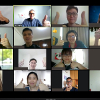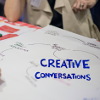Blog
Conversations aren’t new....people have been gathering in circles since pre-history to connect with each other, make sense of the world, share ideas and imagine the future.
Asking questions seems easy, but asking the right questions can make the difference between success and failure when you are defining your future.
Ask the wrong ones and you can easily get distracted…but ask the right ones and you will open up the conversation, engage people and get new perspectives.
That’s why great questions make Creative Conversations such a powerful way to help small and large teams to think differently about the issues that are really important to them and come up with new ways to address them.
Inspired by the World Cafe methodology, this conversation format is a creative way to bring together different ideas, opinions and perspectives to generate real breakthroughs in a short space of time.
As an example, we recently used this set of questions to help a team look back on a challenging project and prepare the way to move forward. These deceptively simple questions took time to craft, but it was the quality of those questions that helped the team to reflect, learn and get ready for the next stage:
Question 1: What has worked well? How do we know it worked well? Question 2: What has not worked well? How do we know it hasn't worked well? Question 3: What did we miss or not do that would have helped us to be more effective?
An option for a Question 4 would be along the lines of : What ideas do we have about what to do next? Which of these ideas would have the most impact?
For each of the conversation rounds, the table composition changes slightly, generating new energy for the next question.
If you want to have a go with your teams, here some simple success factors I recommend for great Creative Conversations:
1/ Make a creative space:
The environment needs to be friendly and welcoming to encourage sharing in small groups and explore the questions you decide on.
This should include small tables, paper tablecloths or flipchart paper to scribble ideas, coloured pens, music etc...be creative!
2/ Ask questions that matter:
The way the questions are designed is critical to the success of the conversations.
They need to be reflective, open-ended questions, which provide focus and direct the discussions to what is relevant and what really matters.
There are many options for great questions, but avoid solution-oriented ones before groups have had time to reflect on the past. Writing the questions on a flip chart by encourages creativity and can make the conversations feel less rigid.
3/ Listen together:
Groups need to let the conversation emerge, listening carefully to each other, allowing time for reflection and clarification.
Let everyone have their say, even if there is a strong temptation to allow a few people drive the ideas. Set the ground rules for this discipline at the outset of the exercise.
4/ Share visible outputs:
Encourage participants to scribble and draw their ideas as the conversations progress.
This helps to build on each others’ thoughts and create a visual story of the emerging themes around each question.
Debrief after each question and post the visual summaries of each question on a wall to build up a complete storyboard.
5/ Agree what was useful and what happens next:
At the end of the conversations, get the group to share in pairs or small groups these examples of key questions which are focused on future action:
- - What was most useful for you in these conversations?
- - Of all those ideas we have had, what is the one idea which will have the most impact?
- - What do you commit to do next?
Creative Conversations can be facilitated with very large groups and can create huge energy and excitement.
We did this recently with a group of over 60 people for a BritCham Singapore event at Prudential, which generated some great ideas to create a workplace where every generation can thrive and grow.
No PowerPoint, just some very lively and creative conversations where everyone contributed to the emerging discussions, listening and sharing their perspective on How to Lead Millennials in a Multi-Generation Workforce.
Look forward to hearing your comments and suggestions!
Don Rapley is the Managing Director of TYC Transform Your Conversations
At TYC, our customised programmes transform the key conversations which Managers have with their teams by developing coaching skills, using simple conversation planners and practising. If you are interested in exploring how TYC can help you, or in just sharing your challenges, let's start a conversation!
.png)
.jpg)
.png)
.png)
.jpg)
.jpg)
.png)
.png)
.jpg)





